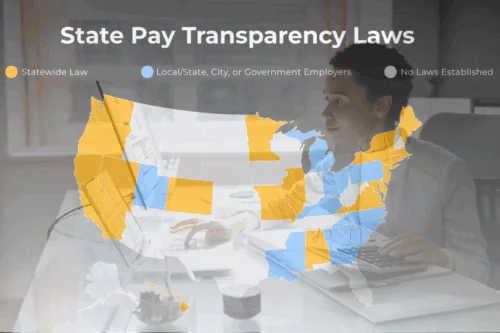Welcome to your comprehensive guide on N.J. labor laws for salaried employees. Whether you’re beginning your career or transitioning to a salaried role in New Jersey, understanding the main regulations and rights is crucial for successfully navigating your professional path.
Why This Guide?
This guide is crafted to equip you with essential knowledge about employment laws that protect your interests as a salaried worker. From understanding your eligibility for overtime pay to knowing your rights during discriminatory situations, this resource is invaluable for anyone entering the workforce.
Dive into the intricacies of New Jersey’s labor laws with us and empower yourself with the knowledge to ensure fair treatment and a rewarding career environment.
Understanding NJ Labor Laws for Salaried Employees
New Jersey’s labor laws are crafted to protect salaried employees, ensuring fair treatment and equitable workplace practices. As a salaried worker in N.J., understanding these statutes is critical to safeguarding your rights.
Classification of Salaried Employees
According to the Fair Labor Standards Act, salaried employees in N.J. are typically classified as ‘exempt’ from overtime. This classification affects how labor laws apply to you, including eligibility for overtime pay and minimum wage standards. Familiarizing yourself with your employment classification is the first step to understanding your rights and obligations under New Jersey labor laws.
Annual Salary Threshold Updates
In response to evolving economic conditions, N.J. regularly updates the salary thresholds to determine exempt status. These updates ensure that your employment terms remain legal and fair.
Websites and Resources
For detailed and timely updates on labor laws for salaried employees, visiting resources like the U.S. Department of Labor’s Wage and Hour Division can provide authoritative information. Recognizing the state-specific regulations can significantly impact your working conditions.
Exploring inclusive and supportive opportunities helps you understand your rights and employers’ expectations, ensuring a balanced and fair work environment. Being informed about N.J. labor laws allows you to advocate for your rights as a salaried employee and creates a more transparent and fulfilling work experience. Understanding how to identify and handle potential legal violations is crucial for a more detailed exploration of N.J. labor laws applicable to salaried employees.
Critical Aspects of N.J. Labor Laws Relevant to Salaried Workers
New Jersey provides several key legal frameworks designed to protect the rights and interests of salaried employees.
Work Hours and Breaks
Despite many salaried employees being exempt from overtime, N.J. labor laws establish guidelines for maximum work hours and break periods. Employers are encouraged to provide reasonable breaks, including lunch and rest intervals, although not strictly mandated for all exempt workers.
Anti-Discrimination Policies
New Jersey is stringent in enforcing anti-discrimination laws in the workplace. Salaried employees are protected under state and federal laws from discrimination based on age, race, gender, national origin, or disability. Understanding these protections helps maintain a safe and respectful work environment.
Payment of Salary
Payment schedules for salaried employees must comply with N.J. state law, which dictates that employees are paid at least twice a month. Additionally, the law covers aspects like the timely payment of earned wages and legal deductions.
Visit the N.J. Labor Wage and Hour Compliance FAQs to help ensure you receive correct wage payments and understand permissible deductions. It is also vital to ensure your benefits from different job offers align with these standards. These N.J. labor laws collectively enable a balanced, fair, and legally compliant environment for salaried employees.
Overtime Provisions Under NJ Labor Laws
In New Jersey, overtime pay regulations can be intricate, especially for salaried employees.
Overtime Eligibility
Generally, NJ labor laws align with federal standards, which exempt many salaried employees from overtime if they earn above a certain threshold and perform specific job duties. However, it’s essential to double-check your eligibility because some job classifications may still qualify for overtime.
Calculating Overtime Pay
For those eligible, overtime is calculated at 1.5 times the regular pay rate for hours worked beyond 40 in a workweek. Understanding these calculations ensures you are compensated fairly.
Exceptions and Misclassifications
Sometimes, employers incorrectly classify employees to avoid overtime payments. If you suspect misclassification, it is important to seek clarification or legal advice.
Information on these regulations can be further explored through resources like the U.S. Department of Labor’s guidelines on overtime or by consulting with a legal professional. Addressing these concerns safeguards your rights and ensures that you are being compensated following N.J. labor laws for salaried employees.
Minimum Wage and Pay Deductions for Salaried Employees in N.J.
N.J. labor laws ensure salaried employees receive fair compensation according to state and federal guidelines.
New Jersey Minimum Wage
The state periodically adjusts its minimum wage to reflect economic changes. Ensuring your annual salary meets or exceeds this adjusted minimum for salaried employees is crucial for compliance and fairness.
Legal Pay Deductions
While certain deductions from a salary are legally permissible, such as for taxes or court-ordered payments, others may not be. It’s vital to understand what can legally be deducted from your paycheck:
- Tax withholdings
- Retirement contributions
- Health insurance premiums
Addressing Improper Deductions
If you notice deductions that seem incorrect or unauthorized, it is important to address them promptly with H.R. The New Jersey Department of Labor and Workforce Development provides resources and support to resolve such issues.
Understanding these compensation standards ensures that salaried employees’ rights are protected under the N.J. labor laws.
Legal Protections and Leaves for Salaried Employees
NJ provides robust legal protections and leave benefits for salaried employees, ensuring a balanced work-life environment.
Anti-Discrimination Laws
NJ salaried employees are protected under state and federal laws against workplace discrimination. These laws cover various bases, including race, gender, age, and disability.
Family and Medical Leave
Eligible employees can take advantage of the Family and Medical Leave Act (FMLA), which allows up to 12 weeks of unpaid leave for specific family and medical reasons while continuing group health insurance coverage.
New Jersey Family Leave Act (NJFLA)
Complementing the FMLA, the NJFLA provides additional protections, allowing up to 12 weeks off in 24 months for the care of a newborn, adopted child, or seriously ill family member without fear of losing their job.
Resources such as the New Jersey Division on Civil Rights provide comprehensive guidelines and assistance for more details on these protections. Understanding your rights when handling job offers can also be crucial to leveraging these legal protections effectively. This framework supports employees’ physical and mental well-being and enhances the overall workplace culture. Next, we will discuss how employees can address and report potential violations of these labor laws.
How To Handle Potential Violations of Labor Laws
For salaried employees in N.J., understanding how to address potential violations of labor laws is essential.
Identifying Violations
First, recognize common signs of labor law breaches, such as unpaid overtime, wrongful deductions, or discrimination. Knowledge is power, and knowing your rights is the first step towards protection.
Reporting Procedures
If you suspect a violation, document everything relevant, including hours worked, pay received, and any communications related to the issue. This documentation can be crucial in any legal proceedings.
Seeking Resolution
- Internal Review: Start by addressing the issue internally through H.R. departments or direct supervisors.
- Legal Advice: If internal resolution fails, seeking advice from a lawyer specializing in employment law might be necessary.
- Official Complaints: You can file a complaint with the N.J. Department of Labor and Workforce Development. They investigate and enforce N.J. labor laws for salaried employees.
By following these steps, you can actively defend your rights under N.J. labor laws, ensuring that you are treated fairly and legally. In the next section, we will guide you through additional resources where you can learn more about these regulations.
FAQs
Am I entitled to overtime pay as a salaried employee in N.J.?
It depends on your job duties and salary. Exempt employees may not be eligible, but non-exempt employees are.
What should I do if I face discrimination at work?
Report the incident to your H.R. department or file a complaint with the N.J. Division on Civil Rights.
How often should I be paid as a salaried employee in N.J.?
N.J. state law requires that employees are paid at least twice a month, regardless of their salary.
Can my employer make deductions from my salary?
Yes, but only for legally permissible reasons like taxes, benefit plans, or court-ordered deductions.
Conclusion
Understanding NJ labor laws for salaried employees is crucial in safeguarding your rights and ensuring fair treatment at work. Familiarity with the specific provisions, from overtime pay to legal protections and leave entitlements, enables you to navigate your career and assert your rights when needed confidently.
Join Diversity Employment
Becoming part of an inclusive network like Diversity Employment provides access to various resources that support your career development within a diverse and equitable workspace. Whether seeking new opportunities or needing guidance on employment rights, Diversity Employment is your partner in career success, ditch the other diversity job boards!
Take action, upload your resume today, and join now to enhance your professional journey while staying informed and protected under N.J. labor laws!




